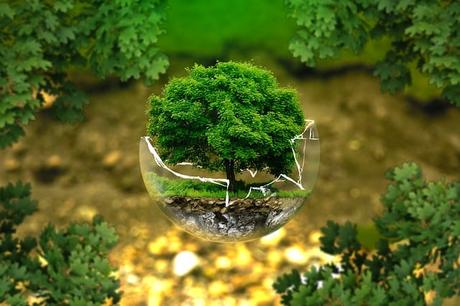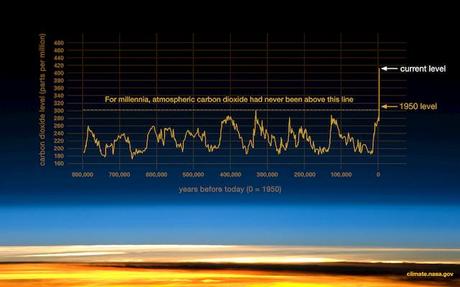Saving the planet sounds like a very important task. And in essence, it is the most important task of every human being on this planet! And you don’t have to be “Captain Planet” to help. There are simpler ways. In other words, “Think Globally, Act Locally” – that should be the main catchphrase for saving the planet and it has been used in various contexts including planning, education, mathematics, business, and (of course) environment.

Climate change is real, and it will influence the future of the human race, and vice versa. In other words, if we choose to act right now we will have a chance to save this world. If we, on the other hand, choose to wait, we will lose this planet. It is that simple.
You see, most of the usual climate changes happen because of small variations in Earth’s orbit that change the amount of heat that enters into our atmosphere and/ or the changes on the surface of the Sun itself.
However, the current abnormal warming trend which is over 95% greater than what should have been possible is attributed to human activity since the mid-20th century. This means that our factories, cars, deforestation, etc. lead us to this point of no return.
How do we know that climate change is real?

” Scientific evidence for warming of the climate system is unequivocal. ”
– Intergovernmental Panel on Climate Change
What can we do to save the planet?
Change starts with you! Think of this planet as your home. You need to care for it. You don’t have to organize or attend some massive “green peace” protests. You just need to keep your environment clean and not waste any energy.
Only a few examples:
- You should use energy-efficient light bulbs;
- You should turn your computer off overnight;
- Save the water any way you can;
- Don’t pre-heat your oven;
- Always recycle glass;
- Don’t waste any napkins;
- Share a shower;
- Plant your own tree;
- Turn off lights when you are not in the room;
- Garden manually;
- Recycle, etc.
To make this long story short, even the thing as small and insignificant like choosing the right beverage container could help save the planet. And how can you save the planet from your small apartment in London?
Plastic, Aluminum, or Glass Bottles?
Beverages are very important when it comes to socialization. Drinking is a custom that knows no cultural or class boundaries – it is a universal language. And when picking a beverage in a store, you have a few options:
- Plastic bottles;
- Glass bottles;
- Aluminum cans.
Which one should you choose? Well, this decision is difficult to make, even for environmentalists. Which one of these three choices is the best for the future of our planet?
All these beverages are in their containers, living on the shelves and coolers. But the important things for us are how they make them, how they transport them, and what we all do with those containers after we use them.
Plastic
According to a group of experts from O’Connor’s Waste Removal Company from London, you should eliminate this one first. They told us that plastic is the worst material for nature. The plastic that doesn’t end up in a recycling bin can later become a very dangerous pollutant for the environment. It will kill the wildlife, and contaminate ecosystems.
Also, according to that company, the oil and natural gas that is needed to produce plastic are buried deep inside the earth’s crust. This means that you need to drill through layers upon layers of rock to reach those materials. And drilling is extremely harmful to the environment, and the process of making plastic is not exactly eco-friendly.
The second reason for you to avoid plastic is the time it needs to decompose in nature. It takes hundreds and even thousands of years to disintegrate. And as it breaks down, plastic releases toxic chemicals into the environment. This is why we recycle plastic. But this is not the answer because there is a limited number of times you can recycle plastic. And once you can’t recycle it anymore, it is usually used to create fabric which, at some point, probably ends up somewhere in a landfill.
Aluminum
Cons – At the beginning, aluminum exists as a group of aluminum oxides called bauxite. And before it “magically” turns into your favorite soda drink, it first has to be mined, shipped to the refinery where it becomes alumina, smelted to become aluminum, and turned into cans. According to official analysis, the global production of aluminum consumes more than 3% of the world’s electrical supply.
Pros – There are, of course, pros for choosing aluminum cans. They save energy and money. Aluminum loses no quality during recycling and can be recycled forever. Same goes for steel, but we are not talking about steel…
In 2012, 70% of aluminum cans were made from recycled aluminum, the cost of which is a lot cheaper to produce than creating a new can from fresh aluminum. In comparison, making a can of recycled aluminum takes only 8% of the energy consumed by making a can from new aluminum.
This is the most recycled material in the world. And as for the cans that do end up in a landfill, they can take up to 500 years to decompose, but that is about 2000 times shorter than it takes for glass to decompose.
Glass
Cons – Yeah, it is true – glass needs over a million years to decompose. However, even if the glass ends up in the landfill, it can’t do anything bad to the planet. Meaning, it won’t leach poisonous chemicals as plastics do. And one key downside for choosing the glass is that glass is often shipped long distances from ordinary recycle companies to glass recycling plants and that adds up to their finale GHG emissions. Not to mention the energy you need to recycle glass and the actual cost of that process.
Pros – Well, glass is not poisonous for the environment which makes it the best pick if your main concern is climate change. That and the fact that the weight of glass bottles has decreased by 40% in the past 40 years…
The Winner is!!!
This depends solely on what your priorities are. As I have already said plastic is out of the picture. It is deadly for our planet. Aluminum can be recycled endlessly and you should choose it as the winner if you want to support the industry that is best at material recovery and recycling. However, the glass should be the best option because it has the smallest carbon footprint.
Glass and aluminum are completely recyclable and are equally good (and bad) for the environment. If you can choose, choose what suits you best.

